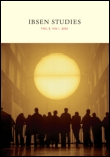
Ibsen Studies
Scope & Guideline
Dissecting the Threads of Ibsen's Influence in Modern Drama
Introduction
Aims and Scopes
- Interdisciplinary Approaches to Ibsen's Works:
The journal promotes a variety of methodologies, including literary analysis, performance studies, and cultural history, allowing for a comprehensive understanding of Ibsen's contributions across different fields. - Focus on Reception and Adaptation:
A core area of the journal is the examination of how Ibsen's works have been received and adapted in various cultural contexts, highlighting the adaptability and relevance of his themes in different eras. - Digital Humanities in Ibsen Studies:
The journal increasingly incorporates digital humanities perspectives, exploring how technology and digital platforms are reshaping the study and performance of Ibsen's plays. - Historical and Cultural Contextualization:
Ibsen Studies places a strong emphasis on situating Ibsen's works within their historical and cultural contexts, thus enriching the understanding of his impact on society and drama. - Exploration of Gender and Power Dynamics:
The journal frequently addresses themes of gender and power, particularly in relation to Ibsen's portrayal of women and societal structures, contributing to ongoing discussions in feminist and gender studies.
Trending and Emerging
- Digital Adaptations and Technology:
There is a growing trend towards exploring how digital platforms and technologies influence the adaptation and interpretation of Ibsen's works, highlighting the intersection of literature and digital culture. - Transnational and Global Perspectives:
Recent articles reflect an increasing interest in the transnational reception of Ibsen's works, examining how different cultures interpret and adapt his plays, thus broadening the scope of Ibsen Studies beyond Western contexts. - Interdisciplinary Connections with Other Art Forms:
The journal is increasingly addressing the relationship between Ibsen's works and other art forms, such as film and visual arts, showcasing the versatility and impact of Ibsen's themes across various mediums. - Gender Studies and Queer Theory:
Emerging themes in gender studies and queer theory are becoming more prominent, particularly in examining Ibsen's portrayal of gender roles and sexual identity, which are increasingly relevant in contemporary discourse. - Critical Engagement with Performance Practices:
There is a notable rise in discussions around performance practices related to Ibsen's works, including adaptation processes and the role of actors, indicating a vibrant interest in the practical implications of Ibsen's texts in modern theatre.
Declining or Waning
- Traditional Biographical Studies:
There has been a noticeable decrease in papers exclusively focusing on Ibsen's biography or life events, suggesting a move away from strictly biographical analysis to more thematic and contextual interpretations. - Classical Interpretations of Ibsen's Texts:
The journal seems to be moving away from conventional readings of Ibsen's texts, which often emphasized moralistic or psychological interpretations, in favor of more innovative and diverse analytical frameworks. - Focus on European Reception:
While Ibsen's works have historically been examined through a European lens, there is a decline in studies that focus solely on European reception, indicating a broader interest in global perspectives and intercultural analyses.
Similar Journals
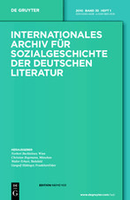
INTERNATIONALES ARCHIV FUR SOZIALGESCHICHTE DER DEUTSCHEN LITERATUR
Fostering Critical Engagement in German Literary StudiesINTERNATIONALES ARCHIV FÜR SOZIALGESCHICHTE DER DEUTSCHEN LITERATUR is a distinguished academic journal published by Walter de Gruyter GmbH in Germany, dedicated to the exploration of the social history of German literature. With an ISSN of 0340-4528 and an E-ISSN of 1865-9128, the journal has been a valuable resource since its inception in 1976. The journal aims to provide a platform for scholarly discourse, offering insights into the historical contexts that shape literary production and theory. Despite its current quartile rankings of Q4 in both History and Literature and Literary Theory, the journal remains committed to fostering rigorous academic discussion and attracting contributions that stimulate critical engagement within the field. While not currently available as an Open Access publication, it serves as an essential repository of research for historians, literary scholars, and students interested in the nuanced intersection of social history and literature. Located at Genthiner Strasse 13, D-10785 Berlin, Germany, this journal is an indispensable source for anyone seeking to broaden their understanding of German literary scholarship.

Abriu-Estudos de Textualidade do Brasil Galicia e Portugal
Bridging Cultures Through Scholarly DiscourseAbriu-Estudos de Textualidade do Brasil Galicia e Portugal, published by UNIV BARCELONA, FACULTAD FILOLOGIA, is a pivotal open-access journal dedicated to the expansive study of textuality across Brazil, Galicia, and Portugal. Since its inception in 2012, this journal has become an essential resource for researchers, scholars, and students interested in the interconnections among literature, linguistics, history, and the arts. With a commitment to fostering academic discourse, Abriu presents a diverse range of articles that examine the richness of cultural and linguistic expressions within the Iberian Peninsula and beyond. With-category quartile rankings of Q3 in History and Q4 in Linguistics and Language, the journal reflects its growing influence in the respective fields, while Scopus rankings underscore its commitment to high-quality scholarship. By providing open-access options, Abriu ensures that valuable knowledge remains accessible to all, furthering its objective to bridge cultures and disciplines in contemporary discussions. The journal’s scope spans critical analyses and innovative approaches in textual studies, making it a vital platform for advancing research and discourse.

Balkanistic Forum
Fostering Scholarly Dialogue on Balkan StudiesBalkanistic Forum, published by Univ Publishing House Neofit Rilski, is a prominent academic journal dedicated to the interdisciplinary study of the Balkan region, encompassing diverse fields including Anthropology, Cultural Studies, History, Linguistics, and Literature and Literary Theory. Established in 2015 and operating out of Bulgaria, this journal aims to promote scholarly dialogue and research that illuminates the complexities and nuances of Balkan societies and cultures. With a commitment to advancing knowledge, it features peer-reviewed articles that not only enrich academic discourse but also encourage the exploration of historical and contemporary issues pertinent to the Balkan area. The journal is classified within the Q2 and Q3 quartiles in various disciplines as of 2023, attesting to its growing influence and contribution within the academic community. Authors and researchers are encouraged to engage with this open-access platform, providing invaluable insights for professionals, students, and scholars interested in the multifaceted dimensions of Balkan studies.

Revue Italienne d'Etudes Francaises
Fostering Scholarly Dialogue Across CulturesRevue Italienne d'Etudes Francaises, published by SEMINARIO FILOLOGIA FRANCESE, is a pivotal open access journal dedicated to the exploration and analysis of French studies within the broader context of history, linguistics, and literary theory. Since its inception in 2011, this journal has fostered scholarly dialogue and critical discourse, offering a platform for researchers, professionals, and students alike to disseminate their work and engage with contemporary issues in these fields. With an ISSN and E-ISSN of 2240-7456, the journal has established itself within the academic community, although it currently ranks in the lower quartiles across various disciplines, as indicated by its Scopus metrics. Nevertheless, the Revue Italienne d'Etudes Francaises remains an essential resource for those seeking to deepen their understanding of Francophone literature, culture, and linguistic dynamics from its base in Rome, Italy, at C/O Fondazione Primoli. As the field of French studies continues to evolve, this journal plays an important role in highlighting the latest research findings and theoretical advancements.

Neo-Victorian Studies
Exploring the Echoes of the Past in Modern CultureNeo-Victorian Studies, published by Swansea University, is an esteemed interdisciplinary journal that delves into the vibrant cultural phenomena reflective of the Victorian era in contemporary contexts. Launched in 2008 as an Open Access platform, it invites scholars, researchers, and enthusiasts to explore the dynamic relationship between the past and present through critical discussions, innovative research insights, and theoretical frameworks. With a unique focus on the resurgence of Victorian themes and narratives in modern literature, arts, and media, this journal plays a pivotal role in advancing the understanding of neo-Victorianism within academia and beyond. Supported by a commitment to accessibility and scholarly excellence, *Neo-Victorian Studies* fosters an inclusive space for dialogue and discovery, making it an essential resource for those engaged in cultural studies, literature, and interdisciplinary research.
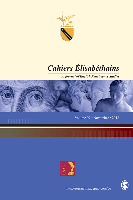
CAHIERS ELISABETHAINS
Celebrating Scholarly Excellence in Historical and Literary StudiesCAHIERS ELISABETHAINS is a prominent academic journal published by Univ Montpellier, dedicated to the exploration of historical and literary themes. With ISSN 0184-7678 and E-ISSN 2054-4715, it has garnered attention both within the United States and internationally. As of 2023, it has achieved respectable rankings in its fields, holding a Q3 quartile in History and a Q2 quartile in Literature and Literary Theory, reflecting its commitment to scholarly excellence. The journal spans a comprehensive timeline from 2004 to 2024, offering a rich tapestry of research and insights into the intersection of history and literature. Although it does not currently operate under an Open Access model, the journal endeavours to present quality contributions that expand academic discourse. Researchers, professionals, and students alike will find in CAHIERS ELISABETHAINS a valuable resource that fosters critical engagement with the past and enriches the understanding of literary contexts.

Anclajes
Connecting Cultures Through Scholarly InsightAnclajes is a prominent academic journal dedicated to the fields of Cultural Studies, Linguistics, and Literature, published by the UNIV NACIONAL LA PAMPA, FAC CIENCIAS HUMANAS. With both print (ISSN 0329-3807) and electronic (E-ISSN 1851-4669) formats, the journal has embraced an Open Access model since 2010, greatly enhancing its accessibility and reach to a global audience. Based in Argentina, Anclajes provides a platform for innovative research and critical discourse, contributing significantly to the understanding of cultural phenomena and literary theories. In recent years, the journal has established itself with a Scopus rank placing it in the top 30% of Literature and Literary Theory and the top 57% of Cultural Studies, as indicated by its quartile rankings for 2023. With issues converging from 2012 to 2024, Anclajes continues to foster scholarly communication and serves as an essential resource for researchers, students, and professionals seeking to explore the dynamism of human culture and expression.
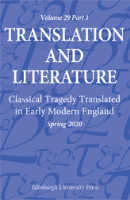
Translation and Literature
Advancing Scholarship in Translation StudiesTranslation and Literature is a leading academic journal published by Edinburgh University Press, focusing on the intricate relationship between language and literature within the realms of translation studies. With an ISSN of 0968-1361 and an E-ISSN of 1750-0214, this journal provides a crucial platform for scholars and practitioners to explore and disseminate research that addresses both the theoretical and practical aspects of translation. Since its inception in 1996, Translation and Literature has established itself as an essential resource, particularly noted for its contributions to the fields of linguistics and literary theory, as indicated by its Q4 ranking in both categories in 2023. The journal's articles are designed to foster dialogue across disciplines, encouraging innovative thinking and collaboration among researchers, professionals, and students alike. Access to this valuable resource is currently available through subscription, ensuring high-quality scholarship reaches a diverse audience dedicated to advancing the understanding of translation's role in literature.

REVISTA CHILENA DE LITERATURA
Advancing literary scholarship and dialogue.REVISTA CHILENA DE LITERATURA, published by Universidad de Chile, Facultad de Filosofía y Humanidades, is a premier open-access journal that has been at the forefront of literary scholarship since its inception in 2004. With its ISSN 0718-2295, the journal focuses on a wide array of topics within the field of literature and literary theory, striving to foster intellectual discourse and innovation. It has gained notable recognition, reflected in its Q2 category ranking in 2023, positioning it among the top journals in its field within the Scopus database, where it ranks #513 out of 1106 journals, placing it in the 53rd percentile. Hailing from Chile, the journal also serves as a vital platform for researchers and students to disseminate their work, enhancing the global dialogue in literature. With a history of convergence from 2007 to 2023, REVISTA CHILENA DE LITERATURA is committed to advancing literary research and its implications in contemporary contexts, making it an essential resource for anyone engaged in literary studies.
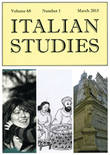
Italian Studies
Exploring the Depths of Italian Culture and HeritageItalian Studies, published by Routledge Journals, Taylor & Francis Ltd, stands as a distinguished academic platform in the fields of Cultural Studies, History, Linguistics, Language, Literature, and the Visual Arts. Established in 1937, this journal has fostered scholarly dialogue and innovation through its robust contributions and in-depth analyses that bridge historical and contemporary perspectives on Italian culture. With an impressive ranking in Q2 and Q3 quartiles across multiple categories, including Literature and Literary Theory, and a current impact factor reflecting its growing influence, Italian Studies serves as an essential resource for researchers, professionals, and students alike. Although not an open-access journal, it remains accessible via institutional subscriptions, ensuring that a wide audience can engage with its critically acclaimed research and articles. Located in the UK, Italian Studies continues to advance the understanding of Italy's rich cultural heritage, making it a vital cornerstone for those invested in the humanities and social sciences.